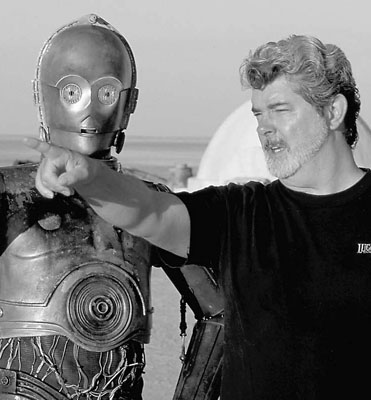Science Fiction
Dictionary
A B C D E F G H I J K L M N O P Q R S T U V W X Y Z
Dexter Dynamically Balancing Humanoid Robot

Dexter is a remarkable dynamically balancing humanoid robot; this might be the first truly bipedal robot that walks the way we do, balancing from moment to moment.
Dexter is the creation of Trevor Blackwell; he's been working on this problem for six years. The key breakthrough was to dramatically improve the robot's own sense of balance. Commercial gyroscopes weren't good enough, so he built his own. Lighter feet helped too.
(Dexter Dynaically Balances like a human being)
On the morning of Valentine's Day, Dexter was walking so well that Trevor and Scott Wiley took the front off his rolling cage (which catches him when he falls) so that he'd have more room. And by that night, Dexter was really walking. The longest walk, which Dan Miller got on video, was over six feet.Now, a week later, Dexter is so good at walking that the limit on the length of his walks is the size of room he lives in. Next step: a cage that can operate outdoors, so Trevor can take Dexter for a walk in the park.
A dynamically balancing robot is really something to see. You can't turn away from it. It's so shockingly anthropomorphic.
The robot's creators claim that Dexter is different from other robots, like Honda's Asimo, because those bots require an absolutely level or regular floor and cannot learn to walk better.
Science fiction fans have been waiting for this for generations; we all have our favorites, but readers seem to like this one:

(C3PO [left] and George Lucas)
Thanks to Adi for writing in with this one. See here for a bit more descriptive info about Dexter.
Scroll down for more stories in the same category. (Story submitted 2/28/2007)
Follow this kind of news @Technovelgy.| Email | RSS | Blog It | Stumble | del.icio.us | Digg | Reddit |
Would
you like to contribute a story tip?
It's easy:
Get the URL of the story, and the related sf author, and add
it here.
Comment/Join discussion ( 1 )
Related News Stories - (" Robotics ")
Atlas Robot Makes Uncomfortable Movements
'Not like me. A T-1000, advanced prototype. A mimetic poly-alloy. Liquid metal.' - James Cameron, 1991.
Humanoid Robots Tickle The Ivories
'The massive feet working the pedals, arms and hands flashing and glinting...' - Herbert Goldstone, 1953.
Golf Ball Test Robot Wears Them Out
"The robot solemnly hit a ball against the wall, picked it up and teed it, hit it again, over and again...' - Frederik Poh, 1954.
PaXini Supersensitive Robot Fingers
'My fingers are not that sensitive...' - Ray Cummings, 1931.
Technovelgy (that's tech-novel-gee!) is devoted to the creative science inventions and ideas of sf authors. Look for the Invention Category that interests you, the Glossary, the Invention Timeline, or see what's New.
Science Fiction
Timeline
1600-1899
1900-1939
1940's 1950's
1960's 1970's
1980's 1990's
2000's 2010's
Current News
The New Habitable Zones Include Asimov's Ribbon Worlds
'...there's a narrow belt where the climate is moderate.'
Can One Robot Do Many Tasks?
'... with the Master-operator all you have to do is push one! A remarkable achievement!'
Atlas Robot Makes Uncomfortable Movements
'Not like me. A T-1000, advanced prototype. A mimetic poly-alloy. Liquid metal.'
Boring Company Drills Asimov's Single Vehicle Tunnels
'It was riddled with holes that were the mouths of tunnels.'
Humanoid Robots Tickle The Ivories
'The massive feet working the pedals, arms and hands flashing and glinting...'
A Remarkable Coincidence
'There is a philosophical problem of some difficulty here...'
Cortex 1 - Today A Warehouse, Tomorrow A Calculator Planet
'There were cubic miles of it, and it glistened like a silvery Christmas tree...'
Perching Ambush Drones
'On the chest of drawers something was perched.'
Leader-Follower Autonomous Vehicle Technology
'Jason had been guiding the caravan of cars as usual...'
Golf Ball Test Robot Wears Them Out
"The robot solemnly hit a ball against the wall, picked it up and teed it, hit it again, over and again...'
Boring Company Vegas Loop Like Asimov Said
'There was a wall ahead... It was riddled with holes that were the mouths of tunnels.'
Rigid Metallic Clothing From Science Fiction To You
'...support the interior human structure against Jupiterís pull.'
Is The Seattle Ultrasonics C-200 A Heinlein Vibroblade?
'It ain't a vibroblade. It's steel. Messy.'
Roborock Saros Z70 Is A Robot Vacuum With An Arm
'Anything larger than a BB shot it picked up and placed in a tray...'
A Beautiful Visualization Of Compact Food
'The German chemists have discovered how to supply the needed elements in compact, undiluted form...'
Bone-Building Drug Evenity Approved
'Compounds devised by the biochemists for the rapid building of bone...'
